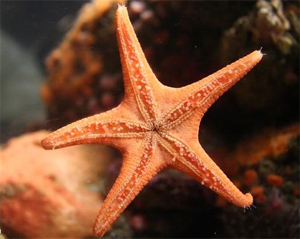|
|
Climate change is expected to cause widespread disruptions to ecosystems and their resident species. Some creatures will go extinct, others will expand their ranges and thrive.
A new study identifies starfish as one of the possible winners from rising ocean temperatures and carbon dioxide concentrations.
Rearing Pisaster ochraceus, a species of sea star, under varying conditions, Rebecca Gooding, Christopher Harley, and Emily Tang of the University of British Columbia in Vancouver found that increased temperature and acidity will significantly boost the echinoderm’s growth rate, more than offsetting the negative effects of reduced availability of calcium carbonate, an important structural building block for many marine invertebrates. The results contrast with other research which has shown a negative correlation between increased ocean acidity and growth rates of calcifying species.
 |
“Our findings demonstrate that increased [CO2] will not have direct negative effects on all marine invertebrates, suggesting that predictions of biotic responses to climate change should consider how different types of organisms will respond to changing climatic variables,” the authors write. “Some
ecologically important species… may directly benefit from acidification.”
Nevertheless the new research is not a cause for complacency. A number of other studies have shown that acidification has wide-ranging impacts on sea life, including disorienting fish larvae and making it more difficult for calcifying organisms like coral reef-building polyps and some types of plankton to form skeletons and protective shells, putting important marine ecosystems and food webs at risk.
Ocean acidification is linked to absorption of carbon dioxide (CO2) by oceans. As atmospheric concentrations rise due to CO2 emissions from fossil fuels and deforestation, oceans become more acidic.
Oceans worldwide absorbed approximately 118 billion metric tons of carbon between 1800 and 1994 according to a report published in 2006 by scientists at the National Center for Atmospheric Research and NOAA, resulting in increased ocean acidity. Should CO2 emissions continue at their current rate, scientists project that global ocean pH levels could drop from 8.1 today to 7.7 by 2100.
In the past, changes in ocean acidity have triggered mass extinction events. According to a study published in the September 2006 issue of Geology, dramatically warmer and more acidic oceans may have contributed to the worst mass extinction on record, the Permian extinction. During the extinction event, which occurred some 250 million years ago, about 95% of ocean’s life forms became extinct.
Rebecca A. Gooding, Christopher D. G. Harley, and Emily Tang. Elevated water temperature and carbon dioxide
concentration increase the growth of
a keystone echinoderm. PNAS Early Edition May 25, 2009.